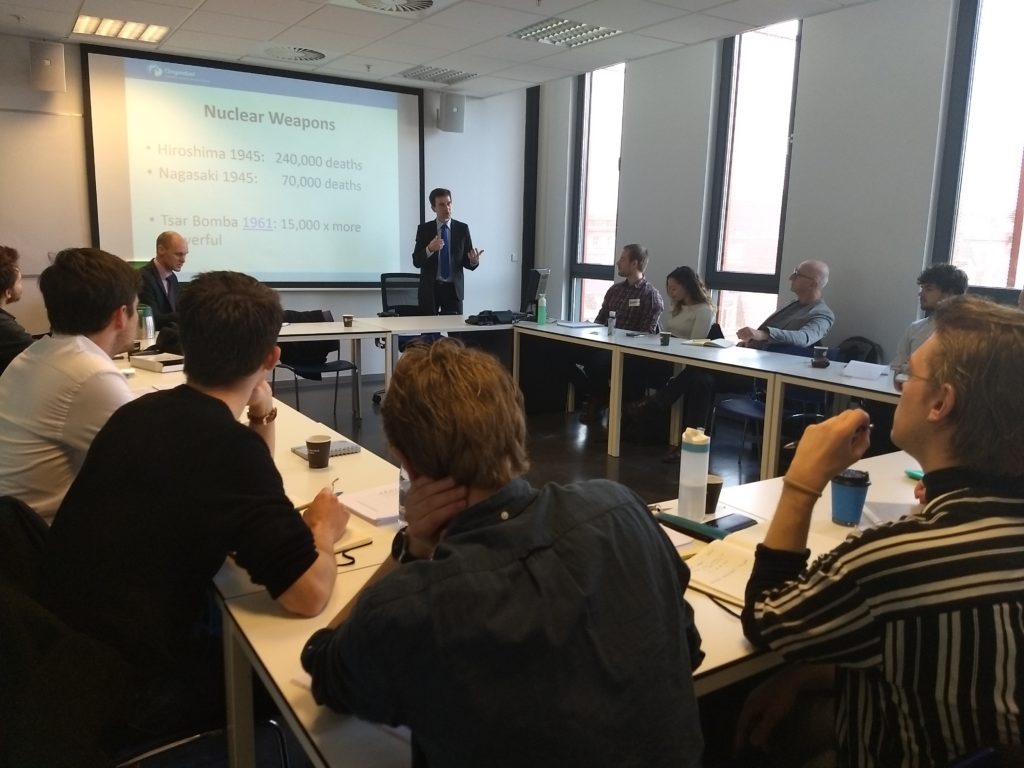By Marije Oude Hengel*
A few hours after our workshop from the Nuclear Diplomacy Crash Course, about “The Basics of Arms Control & Non-proliferation” by Sico van der Meer (Clingendael) and Niels van Willigen (Leiden University), my head was filled with contradictions and puzzles. The nuclear field is sensitive and complicated. During this three hours workshop, my 14 co-participants and I delved into another world, addressing the major developments within the field in the previous century, and discussing the present situation and the prospective evolution.
Naive disarmament wishes
In my naive and young mind, I wish that Donald Trump doesn’t need to increase the number of nuclear weapons to be equal to those from Russia. I wish that Russia and the United States could sit around a table and agree to have the same number of nuclear weapons. In this way, additional nuclear weapons needn’t to be produced, allowing Russia and the United States to dismantle its arsenal simultaneously. I wish that Iran’s claims for a peaceful nuclear development (so civil development) are sincere and trusted by the international community. I wish that North Korea won’t develop its nuclear weapons further and can find common grounds with South Korea. I wish that all states could influence equally the evolution towards the Nuclear Weapon Ban Treaty. And finally, I wish that the discussion would return to the human security instead of the national security. Obviously and unfortunately, the nuclear world won’t be influenced by merely these naive wishes; and the reality is that the outcomes of a nuclear war would still be disastrous: a nuclear winter, disturbing (and maybe even destroying) the whole ecosystem and millions of human’s lives.
Reality: distrust and secrecy
In the international system, such wishes become reality only if states share sufficient power and the political will to change the current course of action. Furthermore, wishes are not of much help when the information is incomplete, when the states retain information, or any inquiries on nuclear weapons is answered with “I can neither confirm nor deny.” The reality is that states share little to nothing on nuclear weapons.
One way to find out if a state has nuclear weapons is by visible nuclear tests, but these are prohibited in the atmosphere, in outer space and under water. Despite global support for a legal framework to ban all explosive nuclear testing (so also underground testing), crucial key countries are still hindering further strengthening this international norm. In these circumstances, the whole misleading and scarcity of the information inhibit an incentive to stop the use and production of nuclear weapons. However, with the information available, excellent expertise and diplomatic skills, distrust and secrecy remain obstacles but not an insurmountable one.
So, for now a world without nuclear weapons may be a fairy tale, though worth dreaming of. To become true, Van Willigen mentioned a few requirements. First, the ability to verify whether the nuclear weapons are actually destroyed, for which we currently lack the technological ability. Second, alternative defense systems need to be designed, making states willing to give up their nuclear weapons. Finally, the political will of all the states is required. The fairy tale is not impossible, it will simply be an extremely long one.
* Marije Oude Hengel participating in the PAX Nuclear Diplomacy Crash Couse 2018 among 14 other participants. She is doing her Master’s in Political Science, with a specialization in Conflict, Power and Politics at Radboud University in Nijmegen.

